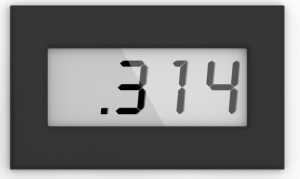Difference between revisions of "Panel Meter"
(some more description) |
m (+links) |
||
| Line 5: | Line 5: | ||
== Usage == | == Usage == | ||
The Panel Meter is an instrument which is used as voltmeter in several cases and | The Panel Meter is an instrument which is used as voltmeter in several cases and | ||
| − | depends on the switch mode setting (operation mode). In mode COEFF the coefficients can be | + | depends on the switch [[Modes|mode setting (operation mode)]]. In mode COEFF the coefficients can be |
setup with the eight potentiometers while the COEFFICIENT switch chooses one of the eight | setup with the eight potentiometers while the COEFFICIENT switch chooses one of the eight | ||
COEFFs which value is displayed on the voltmeter. This allows an easy setup. | COEFFs which value is displayed on the voltmeter. This allows an easy setup. | ||
| Line 15: | Line 15: | ||
== Technical details == | == Technical details == | ||
| − | * The display is analog but digital, in order to be cheap (price around 5 Euro). The instrument is a <code>PM438</code> and normally shows the voltage on the output channel <code>U</code>. | + | * The display is analog but digital, in order to be cheap (price around 5 Euro). The instrument is a <code>PM438</code> [https://www.ett-online.de/Werkstatt/Messwerkzeug/Sonstige-Messgeraete/Panel-Meter-PM-438-digital-mit-3-5-stellige-LC-Anzeige.html][https://www.jameco.com/Jameco/Products/ProdDS/108388.pdf] and normally shows the voltage on the output channel <code>U</code>. |
| − | * The instrument can show bipolar voltages, i.e. it can show values | + | * The instrument can show bipolar voltages (i.e. positive and negative values), i.e. it can show values covering the [[Machine Units]]. |
* Actually the voltmeter shows the voltage (max ±10V) just divided by 10. Values are normally always smaller then +1 (or bigger then -1, respectively). The leading zero (The <code>0</code> in <code>0.123</code>) is omitted in the display, so numbers start with a dot. | * Actually the voltmeter shows the voltage (max ±10V) just divided by 10. Values are normally always smaller then +1 (or bigger then -1, respectively). The leading zero (The <code>0</code> in <code>0.123</code>) is omitted in the display, so numbers start with a dot. | ||
[[Category:Components of The Analog Thing]] | [[Category:Components of The Analog Thing]] | ||
Revision as of 09:02, 9 August 2021
A digital panel meters is part of The Analog Thing. The striking display is located in the lower right on the upper board and a central part of the board
Usage
The Panel Meter is an instrument which is used as voltmeter in several cases and depends on the switch mode setting (operation mode). In mode COEFF the coefficients can be setup with the eight potentiometers while the COEFFICIENT switch chooses one of the eight COEFFs which value is displayed on the voltmeter. This allows an easy setup.
In mode REP or REPF the current OP TIME value is shown or can be changed with control via the voltmeter. In all other positions except OFF the voltmeter shows a voltage (or value) which can be feeded into the OUT jack U on the front panel with a patch cable to a specific input or output.
Technical details
- The display is analog but digital, in order to be cheap (price around 5 Euro). The instrument is a
PM438[1][2] and normally shows the voltage on the output channelU. - The instrument can show bipolar voltages (i.e. positive and negative values), i.e. it can show values covering the Machine Units.
- Actually the voltmeter shows the voltage (max ±10V) just divided by 10. Values are normally always smaller then +1 (or bigger then -1, respectively). The leading zero (The
0in0.123) is omitted in the display, so numbers start with a dot.
